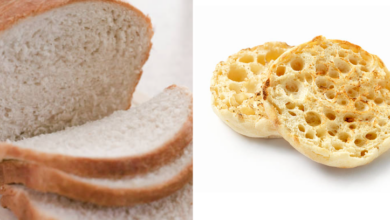The Hidden Sugar Bomb: Is White Bread Really High In Sugar?
What To Know
- Based on this recommendation, white bread is not considered high in sugar, as it typically contains less than 1 gram of added sugar per slice.
- Bread can be a part of a healthy diet when consumed in moderation.
- While white bread is not considered high in sugar, it is important to consider its overall nutritional value and consume it in moderation.
Bread, a staple food in many cultures, has raised concerns about its nutritional value. One of the primary questions is: Is white bread high in sugar? This blog post aims to shed light on this topic, exploring the sugar content of white bread and its implications for health.
Understanding the Types of Sugar in Bread
White bread contains two main types of sugar:
- Natural Sugars: These occur naturally in flour, derived from starch molecules.
- Added Sugars: These are sugars added during the bread-making process, such as sucrose, high-fructose corn syrup, or honey.
The Sugar Content of White Bread
The sugar content of white bread varies depending on the brand, recipe, and serving size. However, on average, a slice (32g) of white bread contains around:
- Natural Sugars: 1-2 grams
- Added Sugars: 0-1 gram
Is White Bread Considered High in Sugar?
According to the American Heart Association, added sugars should be limited to less than 6 teaspoons (25 grams) per day for women and 9 teaspoons (36 grams) per day for men. Based on this recommendation, white bread is not considered high in sugar, as it typically contains less than 1 gram of added sugar per slice.
Health Implications of White Bread Consumption
While white bread may not be high in sugar, it is important to consider its overall nutritional value. White bread is generally low in fiber, vitamins, and minerals compared to whole-grain bread. Excessive consumption of refined carbohydrates, such as white bread, can lead to:
- Weight gain
- Blood sugar spikes
- Increased risk of chronic diseases
Choosing Healthier Bread Options
If you are concerned about the sugar content of white bread, consider choosing whole-grain bread instead. Whole-grain bread is made with the entire grain, including the bran, germ, and endosperm, which provides:
- Higher fiber content
- More vitamins and minerals
- Lower glycemic index
Enjoying Bread in Moderation
Bread can be a part of a healthy diet when consumed in moderation. To balance your carb intake, pair bread with lean protein, fruits, and vegetables. Consider these tips:
- Choose whole-grain bread over white bread.
- Limit your bread consumption to 1-2 slices per meal.
- Avoid processed bread products that are high in added sugars and unhealthy fats.
Recommendations: Making Informed Choices
Understanding the sugar content of white bread empowers you to make informed choices about your diet. While white bread is not considered high in sugar, it is important to consider its overall nutritional value and consume it in moderation. By choosing whole-grain bread or other healthier carbohydrate sources, you can enjoy the benefits of bread while maintaining a balanced and nutritious diet.
Questions We Hear a Lot
Q: Is all white bread high in sugar?
A: No, the sugar content of white bread varies depending on the brand and recipe. Some white bread products may contain higher levels of added sugars, but most have less than 1 gram per slice.
Q: Is whole-wheat bread better than white bread?
A: Yes, whole-wheat bread is generally considered better than white bread because it contains more fiber, vitamins, and minerals.
Q: How can I reduce my sugar intake from bread?
A: Choose whole-grain bread instead of white bread, limit your bread consumption, and avoid processed bread products with added sugars.
Q: Is it okay to eat white bread if I have diabetes?
A: Consult with your doctor or a registered dietitian to determine the best bread options for your individual dietary needs if you have diabetes.
Q: Can I substitute white bread with other carbohydrate sources?
A: Yes, you can substitute white bread with healthier carbohydrate sources such as brown rice, quinoa, oatmeal, or whole-wheat pasta.
